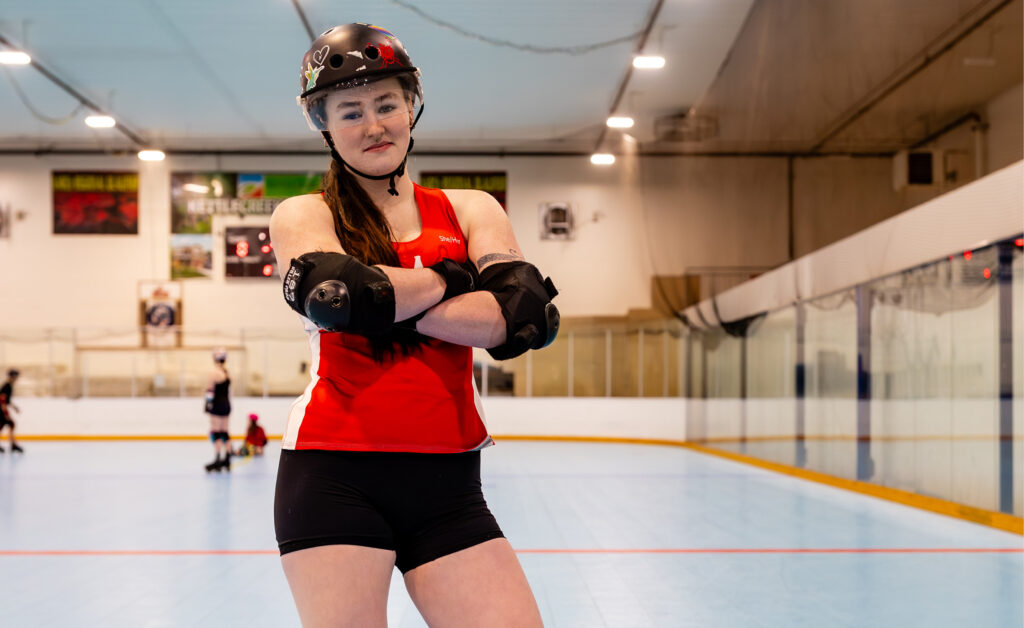Words Jesse Holth
Photo Sarah Hartley Photography
Chloe “Tuffy” Crotty and her teammate Teaghan “Kitty Catapult” Dillon have been selected to represent Team Canada at the Junior Roller Derby World Cup in Australia. Chloe previously served as team captain for The Rotten Apples, and competed last season on B.C.’s provincial roller derby team, where she served as co-captain.
I spoke to Chloe about roller derby’s sense of community, its colourful history, and being part of a sport that’s for everyone.
Tell us about your sport; how does the game work?
Roller derby is a fast-paced game played on roller skates in an oval track. In the two 30-minute periods, two-minute “jams” are held. During those two minutes, five people from each team enter the track. Each team will have one Jammer and four Blockers. Jammers wear a star on their helmet, and their goal is to lap the opposing Blockers as many times as possible in two minutes. Blockers do not want that to happen, so their goal is to stop the opposing Jammer. This sport has a lot of contact, but we have rules and penalties in place to discourage and punish dangerous play.
What was your introduction to roller derby? How did you first get involved?
My first introduction to roller derby was through my step-brother. I thought it was so cool, but I had to wait until I was 10 years old to join. During those two years that I had to wait, I found a graphic novel called Roller Girl. It was about a girl around my age who, like me, never really enjoyed sports before. In the book, you watch her gain confidence and realize her own strength. When I was 11 years old, I got my first pair of skates, started with The Rotten Apples, and the rest is history.
Derby has always been women-focused and women-dominated – you said it doesn’t feel like a sport that’s been borrowed from men. Can you elaborate on this idea?
My amazing teammate and friend Naomi Morell (Scream Soda), who made Team Canada in 2023, had said before that derby doesn’t feel like a sport borrowed from men. I feel like the best way to explain this is that when derby was first started, it was for everyone. I’m not sure how or why, but the first leagues were women’s leagues. It wasn’t something where they said, “OK fine, you can play too, but you won’t be as good as the men.” It was so women-dominated in the beginning that it was more like: “OK fine, the men can play too.” Roller derby is so diverse and it’s not about being a women’s or men’s sport anymore: it’s truly for everyone. I play open division and there are so many different shapes and sizes of people, but roller skates really level out the playing field. Derby is all about momentum and staying low.
You mentioned that the community aspect of the game is really special. Why is this so important?
Roller derby has a very large queer community, and it’s been a safe haven for queer people that want to play sports, but maybe aren’t comfortable or treated as fairly in other sports communities. Derby has a way of attracting some very eclectic people, and I mean that in the most loving way possible. Some of the funniest, sweetest and most athletic people I know are from derby. Derby is freeing in the sense that you get to have a fun name, and maybe wear crazy makeup and hit people around. You get to create a sort of persona.
Roller derby has its roots in the Great Depression and then developed as a contact sport in the 70s – but a lot has changed since then. Can you give us an overview of the history of derby? How has it changed over time?
Derby began as a way to make money during the Great Depression. Leo Seltzer was challenged to create a mix of roller skating and cross-country racing. Transcontinental Roller Derby, as it was named, became extremely popular. Mixed-gender teams would compete in endurance races, and the winners got cash. By the 70s, derby had become a televised and scripted sport that had insane stunts and fights. This is what most people think of when they hear I play derby. In the 80s popularity dropped, and then picked back up again in the early 2000s. By 2004, the Women’s Flat Track Derby Association was founded, and it picked up from there. Roller derby today is much less about crazy fights, and more about athleticism.
You call derby a “labour of love” because none of the players or coaches get paid. It took a lot of hard work and community support to get here – what were some of the challenges? What are you most proud of?
Living on Vancouver Island makes it challenging to play games. The Rotten Apples are the only junior team on the Island, so we have to travel to the mainland for games. In any sport, it can be hard at times to stay motivated and push yourself. This is something that I have struggled with, but I am so fortunate to have an amazing support system of friends and coaches that push me and challenge me to be better and put the work in. I’m so proud of how far The Apples have come. The team was quite small when I started seven years ago, and now we have just over 30 skaters. In roller derby, very few coaches and players get paid, and I think that the size of our league and dedicated members speaks to how much we love the sport. I’m proud of my coaches, who have put in so much work to make sure we have productive practices, fun games, and continue to grow as a team. I’m so proud of myself and my teammate Teaghan Dillon (Kitty Catapult) for sticking with it and making Team Canada.
Congratulations! You have an amazing opportunity this year – you’ve been chosen to represent Canada at the World Cup in Australia in July. Can you tell us what this means?
From across the country, 20 skaters have been selected to represent Canada in Australia at the World Cup. We were chosen based on our skills and coachability. Until the World Cup, I will be training at Westcore Training Centre, in Sidney. We will be travelling to Toronto in May to practise and continue honing our skills as a team before we head to Australia. At the World Cup, we will be facing the U.S., Great Britain, France, Australia, and Belgium. These will all be difficult games, but the goal is to have fun and play to the best of our abilities. Every single year since the World Cup was started, U.S. has won gold. Our goal isn’t to beat the U.S., but to keep a point spread lower than 76. They were upset that Canada kept that last year, and this time we’ll do it again.
Chloe and Teaghan are responsible for covering all their own expenses – if you’d like to help support them visit https://gofund.me/9d671987.




